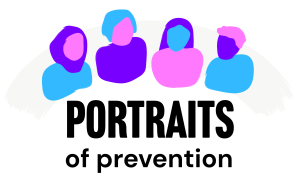
Mel
Women’s health service
Mel is a program manager leading a gendered violence prevention program at a Women’s Health organisation, which is part of Victoria’s Women’s Health Services Network.
The Network has a long history in primary prevention in Victoria. There are currently 12 women’s health services across the state, including five rural, four metro place-based services, and three statewide services. Areas of focus include:
- Gender equality
- Gendered violence prevention
- Sexual and reproductive health
- Mental health and wellbeing
- Women in a changing society
- Preventing chronic disease.
Their work is guided by the World Health Organisation’s Ottawa Charter for Health Promotion which has been foundational to the development of health promotion and primary prevention frameworks around the world, including those focused on primary prevention of gendered and family violence, such as Change the story.
The Ottawa Charter identifies five action areas considered vital for addressing health and social issues at the population level, which the Network describes through their commitment to:
- create better public policies that promote good health
- give people the information and supports needed to make positive, informed choices about their health
- empower communities to have more ownership and control over their health and health services
- ensure the environments where we live, work, learn and play are safe, equal and foster better health outcomes
- improve health service provision, reach and accessibility.
Staff working at women’s health organisations address the drivers of violence against women and gender-based violence as part of a broader, integrated program of work that focuses on health promotion and primary prevention around the social and gender-based determinants of health, addressing intersecting barriers to wellbeing.
This means that prevention of gender-based violence may be their core work, or one of a more general focus on community development, communications, resource development, or gender equity education.
They have an important role to play in building the capabilities of practitioners and partner organisations in the prevention of gendered violence against women through training, forums, partnerships, resource development and policy advice.
Fee-for-service training is an importat source of income for women’s health organisations. More recently, they have also been responding to specific industry needs arising from legislation requiring organisations to comply with workplace standards relating to gender equity.
Their gender-based violence prevention work focuses on coordinated activities through nine place-based regional prevention partnerships. Staff leading these partnerships design the overarching strategy, governance structure, and partnership mechanisms and support public, community, and private organisations in developing, delivering, and evaluating coordinated primary prevention work.
These partnerships include organisations from across various settings, including workplaces, local government, health, education and sport.
Mel has a background in gender equity in international development and health promotion in programs addressing a range of social determinants.
The colleagues Mel works alongside come from highly varied backgrounds, which Mel believes adds richness and depth to their collective efforts. While formal training is important, Mel believes that an appropriate worldview and shared values are essential foundations to doing this work safely and effectively.
Many of Mel’s colleagues bring experience in health promotion and public health, which provide a solid grounding in social determinants of health, behaviour change theory, and community engagement. Others have transitioned from roles in response sectors or fields such as teaching, youth work, social work, law and nursing.
Mel’s prior experience has given her expertise in project management, participatory program development and capacity building, which have helped her design and lead impactful programs. Mel’s expertise in knowledge translation allows her to take complex ideas and share them effectively with her audience.
Drawing on her background in health promotion and using frameworks like the Ottawa Charter, Mel consistently applies a social determinants approach to her work, with a particular focus on gender.
Academic research, analytical thinking, and critical thinking also play prominent roles in her approach, as does her commitment to addressing systemic inequities. Mel sees these skills as broadly applicable across social determinants-focused work, noting that while primary prevention requires specific expertise, many of the core competencies are widely transferable.
Since entering the primary prevention field, Mel has developed a range of new skills specific to the sector. She has learned to respond appropriately and sensitively to disclosures of violence, facilitate training sessions and consultations and cultivated a deeper understanding of family violence prevalence, forms and response services.
Mel has also refined her approach to handling resistance and backlash, as well as avoiding collusion when engaging with men and boys around dominant forms of masculinity and gender inequality. Working in this space has led her to a more comprehensive grasp of gender-transformative practice and intersectionality.
Mel has also become proficient in using values-based messaging frameworks, such as Common Cause, to create resonant, purpose-driven communication tailored to specific audiences. Mel has also learnt how to work as a part of a local partnership, seeking out grant funding, reporting and acquitting to government funders, building long-term relationships, and advocating for prevention in family violence policy.
To continuously build her skills and knowledge, Mel relies on both formal and informal learning avenues. She emphasises the importance of learning directly from the communities she works with, adopting a curious and open-minded approach that allows her to synthesise knowledge in real time.
Collaboration is also essential, as Mel finds that working alongside others provides valuable insights into diverse perspectives. She regularly participates in communities of practice, attends practice forums and seeks networking opportunities to expand her understanding and build her networks.
Professional development is supported by her organisation, and Mel has engaged in a variety of training programs offered by Safe and Equal, Our Watch and other women’s health organisations. These include courses specifically tailored to family violence prevention, as well as training on values-based messaging, responding to disclosures, and managing resistance and backlash.
She also benefits from knowledge-sharing within her team and specialised programs like Fast Track and Lead and Adapt, which address sector-specific skills not covered by standard management training. A lot of key skills have not been learnt through her higher education or professional development but through on-the-job learning and practice.
When working with men and boys in prevention, Mel grounds her work in practice principles that help balance the risk of both collusion and disengagement. She believes that it is essential for men working in gendered violence prevention to demonstrate humility, accountability and a commitment to gender equity.
As a program manager, she works with the men in her team to set clear expectations at the outset and create a supportive environment that supports productive feedback and self-reflection. In her direct practice, Mel draws on frameworks like the Health Belief Model and resources like Common Cause’s Messaging Masculinities to guide her approach. Mel also partners with other organisations where possible to learn, participates in webinars and programs and advocates for some key matters to be integrated into the whole organisation.
Intersectionality is a core principle in Mel’s approach to primary prevention. She advocates for cultural competence, cultural humility and trauma-informed practice as essential components of the work.
Mel values partnerships with people and organisations from diverse backgrounds and understands the importance of when to step back and let others lead. She also places great importance on internal reflection, encouraging her organisation to address biases and enhance cultural safety within its programs.
Mel acknowledges that perfect execution isn’t always possible but stresses the importance of continuous improvement and accountability. In roles where specific cultural or community representation is essential, Mel believes lived experience should be a requirement to ensure that prevention work is informed and authentic.
Responding to disclosures of violence is another area where Mel has honed her skills. She often encounters disclosures during program delivery and training, and she approaches these situations with clear boundaries and role-appropriate support. Mel has received specialised training in disclosure response from Safe and Equal. She recognises the importance of maintaining professionalism and knows how to direct people to response services as needed.
Read more portraits of prevention
Starlady
LGBTIQ+ primary prevention – Zoe Belle Gender Collective
Zoe Belle Gender Collective is a small trans and gender diverse-led advocacy organisation that was previously funded as a pilot project under Rainbow Health Australia’s primary prevention project.
Jessica
Sport setting
Jessica is a manager in a specialist gendered violence prevention team that is funded to build the capacity of community sport and recreation to address and prevent gender-based violence.
Samantha
Specialist primary prevention
Samantha is a senior practice leader working in one of the small number of specialist organisations that are solely focused on primary prevention.



